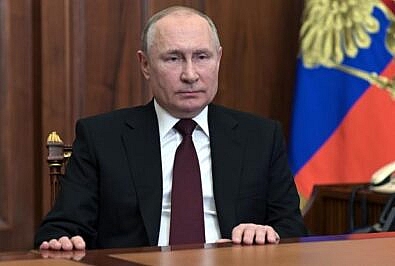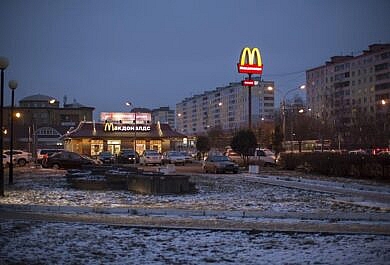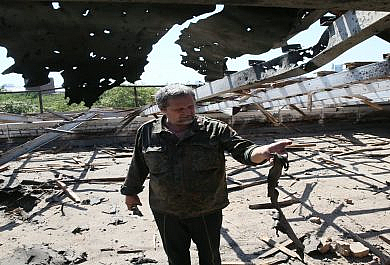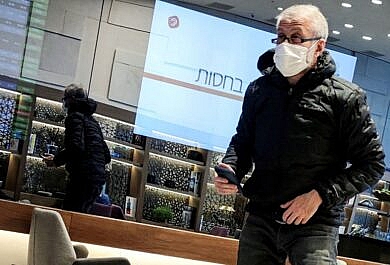Russian dictator Vladimir Putin put his country’s nuclear forces on “special alert” Sunday morning.
Summary
Russian dictator Vladimir Putin put Russia’s nuclear forces on “special alert” as Ukrainian defiance slows his invasion, and the West imposes massive sanctions on the Russian economy.
- Putin ordered Russia’s nuclear forces put on “special alert,” a move the United States condemned as a “totally unacceptable” escalation. It’s unclear the precise meaning of this order.
- Ukraine announced negotiations without preconditions between Kyiv and Moscow would begin Sunday on the Belarusian-Ukrainian border.
- The Pentagon now believes Russia has committed two-thirds of its forces inside Ukraine but still has not taken a major Ukrainian city after four days of war.
- Russia failed to take Kyiv and Kharkiv after major assaults on Saturday. Battles continued Sunday as the Russians continued their assault and Ukraine launched attacks on Russian supply lines.
- The West imposed severe financial sanctions on Russia including freezing their central bank assets. Many European countries also banned Russian planes from their airspace.
![]()
- In a major reversal, Politico reports Germany will spend €100 billion on defense to upgrade its armed forces. Former president Donald Trump repeatedly attacked Germany for not pulling its weight in NATO when he was president.
- The Washington Post examined the newest round of sanctions the US and Europe have aimed at the Russian economy. The West will block the Kremlin from accessing its foreign currency reserves and cut off Russian banks from the SWIFT global financial messaging system. These moves threaten to crater the Russian economy.
- CNN called Ukrainian President Volodymyr Zelensky “a profile in courage.” Zelensky refused a US offer to evacuate him from Kyiv, saying “I need ammunition, not a ride.” Zelensky has remained in the capital to lead his people and released a series of resolute, defiant videos to bolster Ukrainian morale.
![]()
- The Wall Street Journal covered the thousands of ordinary Ukrainians who have risen to defend their nation from Russia. WSJ interviewed a political consultant handling a weapon for the first time who spoke for many, saying “I am fulfilling my duty as a Ukrainian citizen, a father and a son.”
- Fox News interviewed former Secretary of State Condoleezza Rice, who described Putin as “erratic” and “descending into something,” very different from the Putin she interacted with during the Bush Administration. The full interview is worth your time.
- National Review examined why the Russians are struggling to take Ukraine. The author, a veteran and defense expert, investigates in detail the shortcomings of Putin’s army and how Ukraine has been able to resist their advances so far.
Author’s Take
It’s been clear for twenty years Putin is a malign influence on the world stage – he’s thought to have engineered false flag terror attacks on his own people, invaded Georgia in 2008, Ukraine in 2014 and intervened in Syria in 2015, used chemical weapons on UK soil, poisoned a Ukrainian presidential candidate and an opposition leader, and had his rivals and journalists assassinated.
But for too long, politicians of all stripes told themselves that great-power conflict and wars of conquest were a thing of the past. Europe has chronically underfunded its military defenses for years. European politicians – especially Germany’s leaders – have hobbled their energy security in the name of environmentalism while leaving their countries dependent on the Russian gas pump.
The populist right in Europe and America admired Putin’s “strength” and encouraged close ties with this thug. On both continents, these figures have scrambled to reverse their pro-Putin rhetoric after his invasion. American voters of both parties are united in their disdain for Vladimir Putin – it’s elites on the left and populist right who are out of step.
Ronald Reagan said, “Freedom is a fragile thing and it’s never more than one generation away from extinction. It is not ours by way of inheritance; it must be fought for and defended constantly by each generation, for it comes only once to a people.”
Ukrainians know this. Stories of Ukrainian defiance – their heroic president, the “Ghost of Kyiv,” the defenders of Snake Island, the man who disarmed a mine without dropping his cigarette – have stirred citizens the world over. Putin’s war has reminded people privileged to live without fear of invasion the importance of freedom and military power. May we never forget these lessons.
© Dominic Moore, 2022






